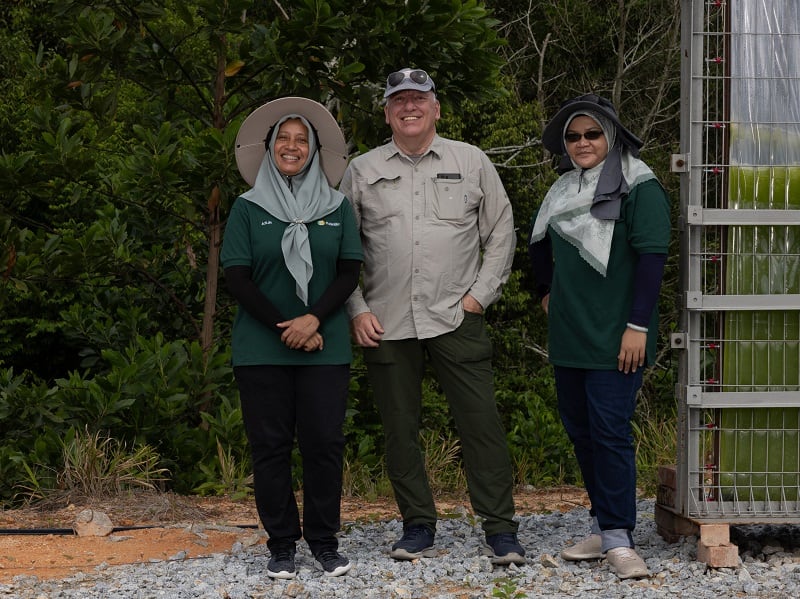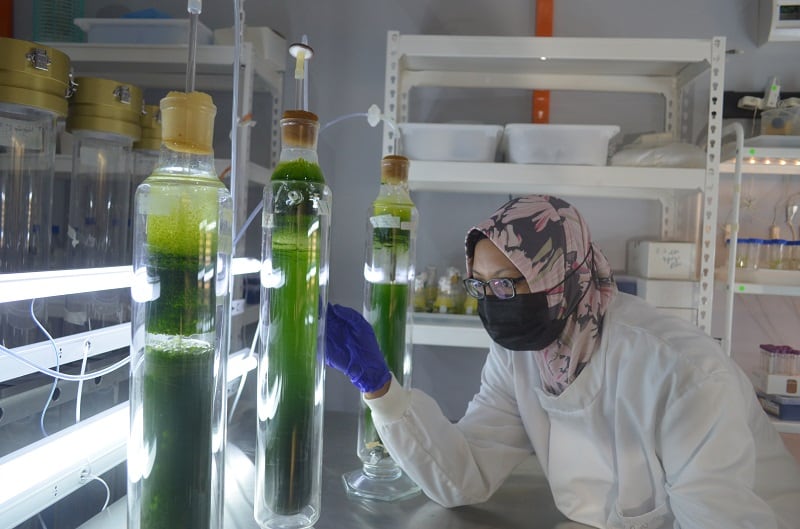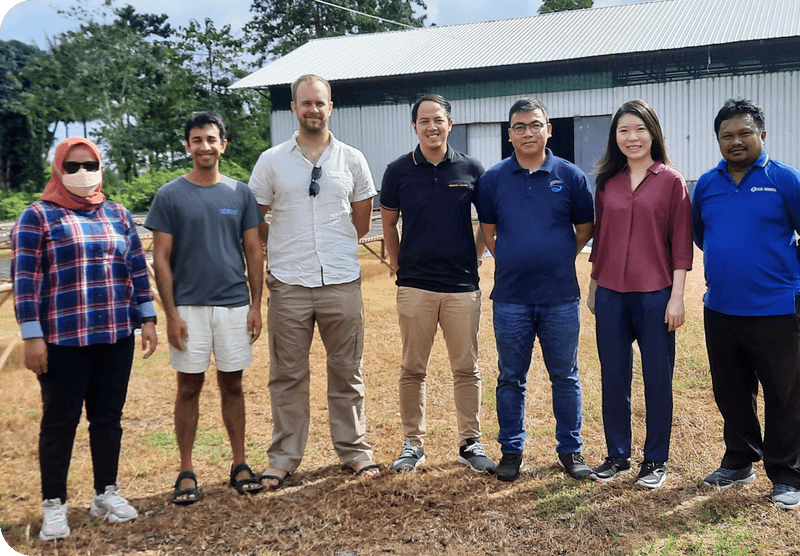After a decade of research and development, HutanBio, a biotech company founded by scientists from Cambridge University in the UK and in Malaysia, has secured investment from the Clean Growth Fund, a £101 million clean-tech venture capital fund, to accelerate the commercial use of its algae-based biofuel oil, called HBx.
The company aims to secure a significant share of the maritime fuels market over the next decade. This sector has been mandated by the International Maritime Organisation to reduce CO₂ emissions by at least 40% by 2030 (compared to 2008), to account for its carbon emissions this year (2024) and stop using fossil fuels by 2050.
What’s the plan?
The company describes the oil as a ready-made drop-in replacement fuel for the global shipping industry. The sulphur-free fuel uses CO₂ greenhouse gas as a feedstock for algae that are grown in special ‘bio-reactor farms’.
These farms will be built on unproductive and non-agricultural semi-arid and arid land in countries where there are high levels of sunlight. The company is investigating the possibility of its first bio-farms to be in Morocco and Australia.
Is sustainable fuel actually sustainable?
The concept of sustainable fuel hit the headlines in November last year when Virgin Atlantic revealed it would test fly a Boeing 787 from London to New York fuelled mainly with used cooking oil and plant-based products. These plans were dismissed as well-intentioned but ultimately unsustainable. For one, the fuel costs three to five times as much as regular jet fuel. Reports have added that half of all UK agricultural land – or more than double its renewable electricity supply – would be required to make enough sustainable aviation fuel for the country to reach ‘Jet Zero’ by 2025.
Other studies have suggested that fuel from microalgae may actually emit more carbon during production and use than petroleum-based diesel.
What will the algae-based fuel cost?
Concerning the potential cost of the fuel, HutanBio’s chief executive Paul Beastall told AgTechNavigator the company has benchmarked its target pricing against current B100 biofuel options and believe this will provide a “credible business case for scale up”.
HutanBio claims it has addressed a series of social and environmental challenges that many other biofuels face. The biofarms aim to increase a country’s energy security, provide a major economic stimulus, and enhance the local environment, explained Beastall.
For example, given the need for CO₂ as a feedstock for its algae, HutanBio expects to locate some bio-reactor farms on land adjacent to high CO₂-emitting heavy industries. HutanBio will offer these industries, like the cement industry, a ready-made and circular carbon capture and use solution, whilst also allowing the HBx biofuel to be used in their operations.
HutanBio’s project development approach is through modular expansion to suit market demands, helping to build supplies of HBx in a manageable and sustainable way. “Farms will be scalable from a few hectares up to tens of square kilometres with our modular architecture able to scale to meet available land and also the amount of fuel required,” said Beastall.

He stressed the land being eyed by the company avoids competition with agriculture and does not drive deforestation or peatland destruction and, unlike current biofuels from terrestrial oil-crops, does not compete for food resources.
“The land is non-productive as it is generally in areas without large volumes of fresh water,” he said. “Our algae grows in salt water and so we have no need for fresh water. Therefore, we are targeting coastal desert regions for our initial deployments, areas that are not currently used for agriculture.
“A key benefit of using this land to grow new crops is that we will be able to increase the photosynthetic capacity of the planet, further helping to combat climate change. We do not see any real competitors for this surface land. In many areas, it is used for mining or mineral extraction, but this is totally compatible with the surface land being used for oil farms. Land we are looking at is generally owned by large organisations like multi-national commodities operators or local/national governments.”
The farms are expected to have a low energy consumption, he continued. “The bulk of the energy required for the farms will come directly from sunlight. This is why we are targeting land within 40 degrees of the equator to maximise available energy. Relatively low amounts of energy are required for pumps to move the fluid around and to bubble the CO2 and air through the bioreactors. All the energy apart from sunlight will be electrical which can come from solar photovoltaics (we are operating in areas of high solar load), fuel generators running on our own fuel or from a local, low-carbon electricity supply if available.”
The company, he added, has prototype bioreactors that it has been using for a number of years. “We will require a large number to scale and part of our seed funding will be to develop the next generation of our scale-up photobioreactors,” he said.
A new species of microalgae was found
Where does the company get the algae to make the oil? A current barrier to the algae industry’s attempt to scale up, for example, is a lack of hatchery capacity (where fertile wild kelp needs to be stimulated to produce spores in water tanks).
“HutanBio technology is based on a new-to-science species of unicellular extremophile microalgae,” explained Beastall. “The team carried out massive bioprospecting screens of wild marine algae searching for those rare species that could survive under the harsh conditions of industrial biofuel production in semi-arid and arid land. We then engineered using natural genetic selection approaches industrial production strains with combined heat, light, salinity and drop-in biofuel production. Our HBx production strains naturally switch to bio-oil accumulation as they grow. Unlike macroalgae kelp, they do not sporulate, and so we avoid that bottleneck.”
Highlighting HBx’s commercial opportunity in global shipping, he added: “We have designed HBx from the outset to blend seamlessly with existing infrastructure and supply chains. It requires no engine or vessel modification, meaning adoption of HBx can be immediate and without affecting operational efficiency. Vessel life can be maximised whilst carbon emissions are reduced without changing ship and port operations which is crucial for rapid deployment.”
A science-based company to a commercial venture
The science behind HutanBio has been led by three people and who founded the company: Dr John Archer from Cambridge University (now the company’s Chief Scientific Officer), Noor Azlin Mokhtar, originally a PhD student at Cambridge working with John and now the company’s Director of Operations, and Suhaiza Ahmad Jamhor, who has a Masters degree in Biotechnology from Universiti Selangor in Malaysia. Paul Beastall has had a career in scaling UK technology companies and has been instrumental in transforming HutanBio from a science-based company into a commercial venture.
Commenting on the Clean Growth Fund investment, Dr John Archer said: “Clean Growth Fund’s investment in HutanBio, coupled with the strong commercial interest in HBx now being shown by potential customers from around the world, is hugely exciting and underlines the company’s massive potential.
“We have been patient and rigorous in our scientific work to ensure that HBx is market-ready, demonstrating the world-class expertise and tenacity of our team. We believe that HBx unlocks the biofuel puzzle, with the capability to produce a cost-effective biofuel an order of magnitude greater than any other oil-crop.”
Dr Jonathan Tudor, Investment Partner at Clean Growth Fund added: “The positive impact that HBx can have on today and tomorrow’s world is significant. We know that the use of algae has long been recognised as a promising source of biofuel and for varying reasons many companies have failed to successfully commercialise, but the scientific rigor of HutanBio, the qualities of HBx and the market opportunities it has in the shipping and aviation sectors in particular gives Clean Growth Fund cause for great celebration to support the company’s future growth.
“HutanBio can be a major disruptor in the fuel supply market and make a major contribution to the decarbonisation of transport and the hard-to-abate heavy industries.”




